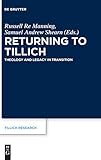Returning to Tillich : Theology and Legacy in Transition / ed. by Russell Re Manning, Samuel Andrew Shearn.
Material type: TextSeries: Tillich Research : Tillich-Forschungen / Recherches sur Tillich ; 13Publisher: Berlin ; Boston : De Gruyter, [2017]Copyright date: ©2018Description: 1 online resource (XIV, 222 p.)Content type:
TextSeries: Tillich Research : Tillich-Forschungen / Recherches sur Tillich ; 13Publisher: Berlin ; Boston : De Gruyter, [2017]Copyright date: ©2018Description: 1 online resource (XIV, 222 p.)Content type: - 9783110532852
- 9783110532869
- 9783110533606
- 230.092 23
- BX4827.T53 R49 2018
- online - DeGruyter
- Issued also in print.
| Item type | Current library | Call number | URL | Status | Notes | Barcode | |
|---|---|---|---|---|---|---|---|
 eBook
eBook
|
Biblioteca "Angelicum" Pont. Univ. S.Tommaso d'Aquino Nuvola online | online - DeGruyter (Browse shelf(Opens below)) | Online access | Not for loan (Accesso limitato) | Accesso per gli utenti autorizzati / Access for authorized users | (dgr)9783110533606 |
Frontmatter -- Table of Contents -- Abbreviations -- Acknowledgements -- Foreword -- Introduction: Returning to Tillich -- Chapter 1. Which Kant? Whose Idealism? Paul Tillich’s Philosophical Training Reappraised -- Chapter 2. Tillich and Participation -- Chapter 3. Compromised Correlation? Experience in Paul Tillich’s Concept of Correlation -- Chapter 4. Tillich’s Account of Love. Re-visiting Self-less Love -- Chapter 5. Kairos, History, and Religion. Some Insights on Tillich’s Understanding of Revelation in Dialogue with Karl Barth -- Chapter 6. Answering Sartre. Paul Tillich and the ‘Socrates of Nothingness’ -- Chapter 7. Is Green the Colour of our Redemption? -- Chapter 8. Tillich for Today’s Church. Self-critique, Self-transcendence, and the New Reality -- Chapter 9. The Sacred Art of Teaching. Paul Tillich on Place, Boundary, and Pedagogy -- Chapter 10. Paul Tillich, Salvation, and Big, Unnecessary, Crazy, Travel Adventure -- Chapter 11. “One can distinguish two ways of approaching God: the way of overcoming estrangement and the way of meeting a stranger.” Paul Tillich’s Engagement with Buddhism -- Chapter 12. Two Forms of Dialectic within Tillich’s History of Religion -- Chapter 13. Schleiermacher and Tillich on Judaism: A Structural Comparison -- Chapter 14. Paul Tillich, Being Itself, and the Structure of Vedantic Panentheism -- Chapter 15. Paul Tillich and the ‘Dark Night of Faith’ as Mystical Experience -- Epilogue: A Dinner Speech Tillich in Transition -- Contributors’ Details -- Bibliography -- Index
restricted access online access with authorization star
http://purl.org/coar/access_right/c_16ec
Fifty years after his death in 1965 the essays in this collection return to Paul Tillich to investigate his theology and its legacy, with a focus on contemporary British scholarship. Originating in a conference held in Oxford in 2014, the book contains 16 original contributions from a mixture of junior and more established scholars, most of whom have a connection to Britain. The contributions are diverse, but four themes emerge throughout the volume. Several essays are concerning with a characterisation of Tillich's theology. In dialogue with recent emphases on the radical Tillich, some essays suggest a more conservative estimation of Tillich's theology, rooted in the Idealist and classical Christian platonic traditions, whilst in constant engagement with changing existential situations. Secondly, and perhaps reflecting the context of religious diversity and theories of religious pluralism in Britain, many essays engage Tillich's approach to non-Christian religions. Thirdly, some essays address the importance of existentialist philosophy for Tillich, notably via an engagement with Sartre. Finally, a number of essays take up the diagnostic potential of Tillich's theology as a resource for engaging contemporary challenges.
Issued also in print.
Mode of access: Internet via World Wide Web.
In English.
Description based on online resource; title from PDF title page (publisher's Web site, viewed 28. Feb 2023)


